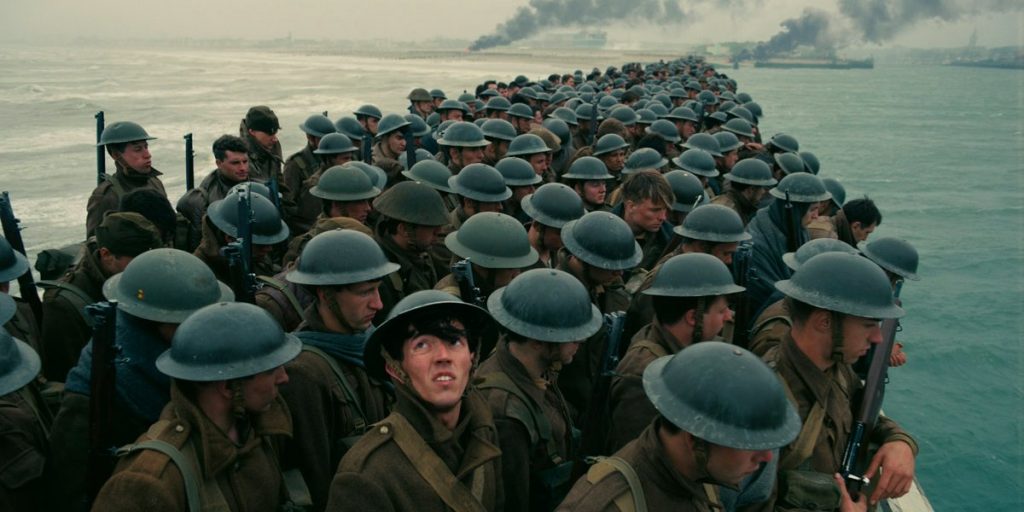DUNKIRK
Warner Bros
Director: Christopher Nolan
Written by: Christopher Nolan
Cast: Tom Hardy, Cillian Murphy, Kenneth Branagh, Harry Styles, Mark Rylance
Screened at: AMC Lincoln Square, NYC, 7/17/17
Opens: July 21, 2017
Sometimes, spending time in Europe is not all it’s cracked up to be. Nowadays tourists may have to look over their shoulders to make sure that a bomb will not go off in a night club. Or a fanatic might have to urge to shoot up a discotheque, a restaurant, a major train depot. Yet times were quite a bit worse some decades ago when full-scale war would ultimately lead to 70 million deaths, mostly of civilians. The U.S. was lucky enough to stay out of the action in 1940 especially when Germany had a unit of French and British soldiers pinned down in Dunkirk. In May 1940 the British Expeditionary Force aiding the French was cut off from the rest of the French army by a German advance, leading the allied powers to retreat to the port of Dunkirk. A lull in the fighting gave the British time to evacuate by sea, as Prime Minister Winston Churchill ordered any ship available whatever the size to collect the stranded soldiers. 338,226 men were evacuated via 900 vessels, most rescued from the harbor, others taken from beaches.
The miracle of Dunkirk as it became known should have been a terrific theme for a filmmaker like Chris Nolan, with lots of funding to work with. Christopher Nolan, whose preference for nonlinear exposition is on duty with “Dunkirk,” is known as well for cerebral films such as “Inception,” in which a thief steals corporate secrets using dream technology and “Interstellar” which finds explorers traveling through a wormhole in space to ensure humanity’s survival. With “Dunkirk” Nolan enjoys the use of IMAX (thankfully not 3-D) to bring the audience into the action. But he messes up in several ways:
First, Nolan does not visually give the impression that the Allied forces were encircled by Germans, praying for a miracle and feeling that this battle could be their last.
Second, and more important, Nolan employs non-linear filmmaking, avoiding the better approach—which would be chronological. Instead “Dunkirk” uses three separate settings, cutting furiously from one to the other for no apparent reason other than his ideological drive to be, well, nonlinear. With the appropriate chapter headings, at least at first, he opens with the scene on land about a week before civilian boats are to approach the port of Dunkirk. Slightly earlier he hones in on scenes of the sea, ultimately switching to the goings-on by air. In fairness Nolan had stated that he wanted to make a movie about war and not a war movie; that is, presumably to show in the most vivid, IMAX-aided way that war is hell. The result is simply confusion.
Third, there is no humor whatever. Blink and you’ll discover maybe three women in the entire picture, one of them serving white bread and jam to the soldiers and one dishing out the cuppas.
Fourth, there is no real story here, just men surviving or not under fire from torpedoes, bombs, and guns from the enemy whose faces we do not see at all—except for, maybe, some German spy who is traveling with the Allies. There’s nothing like the movies to present spectacle: theater cannot begin to approach vivid scenes in far-larger-than-life size. But everybody likes a story, and there is no story here.
“Dunkirk” is a thriller that does not thrill, a tale of heroism with no center, individuals with limited dialogue such as a shell-shocked fellow (played by Cillian Murphy) who bundles up in a corner, a Commander Bolton (Kenneth Branagh) who would be much better off playing Shakespeare (remember his Hamlet, Iago, Benedict? He went once more unto the breach in “Henry V” and rouses the men with “We few, we happy few, we band of brothers,” sending shock waves throughout the audience, motivating his men who are outnumbered by the French.” Not only is “Dunkirk” bereft of a single, glorious speech, it appears to lack written dialogue, at best a film that could have been improvised.
I’ve seen more exciting shots of aviation flights in “Thirty Seconds over Tokyo,” a real story in “Saving Private Ryan,” a plea to end wars in “All Quiet on the Western Front,” a mixture of humor with seriousness in “Good Morning, Vietnam.” In “The Bridge on the River Kwai,” the audience had good reason to breathe a sigh of relief when the Japanese supply train drops helplessly over the exploded bridge. “Dunkirk” lacks an overriding theme that could get the audience cheering or even a single thrill that could knock them out of their seats.
Rated PG-13. 106 minutes. © Harvey Karten, Member, New York Film Critics Online
Comments, readers? Agree? Disagree? Why?
Story – C
Acting – C
Technical – B+
Overall – C






